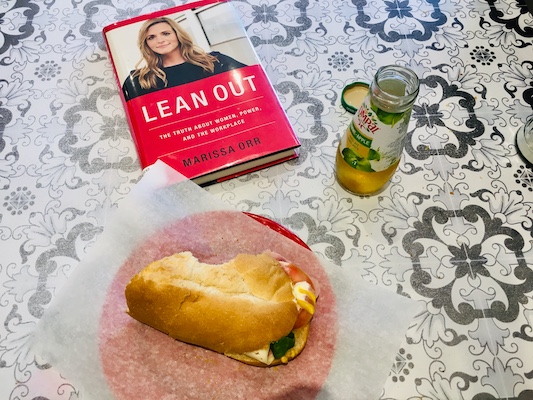Did Sheryl Sandberg’s Lean In make you want to cry out in despair? Me too. Marissa Orr’s Lean Out, on the other hand, made me want to shout out my wholehearted agreement
When I read Sheryl Sandberg’s Lean In a few years ago, I wanted to cry, rage and throw the book across the room. It made me feel irrelevant, odd, and lazy because I don’t care to have a big career where I bust my ass 12 hours a day in profit-serving work that would infest my life like a non-native species were I to rest for a minute.
On the other hand, when I read Marissa Orr’s Lean Out, an open response to Sheryl Sandberg’s book, I certainly shed a tear or two while turning pages. But for a completely different reason. I felt recognized, heard, and validated.
Today, for example, I had an almost uncontainable urge to leap to my feet in the café where I was reading the book over lunch. I wanted to shout out to the other women in that little Portuguese bakery: “Finally! Someone who understands!”
But that would be weird. A blog post seemed like a better way to make the point to a more willing audience, so here I am.
My lunch break started out normal. I was scrolling my phone and eating a ham sandwich. Then I remembered I had a book in my backpack. I cracked open Lean Out and dove in where I’d left off the day before: Chapter Seven, “The Power Reward.”
In this chapter, Orr describes how in corporate culture, the reward for good work is a promotion. So top performers are given more money and more “power” in exchange for their sustained effort and increasing expertise. Power in the traditional workplace can be defined as an increase in “authority over other people,” she explains.
So the way to earn more money and have more impact in the world is to give orders to others, inside a structure where people are obligated to follow through? My gut response: UGH.
Authority vs. influence
Orr goes on to describe an alternative way of holding power — through influence, rather than authority. Unlike authority, influence requires consent from the people who take direction. It is “cultivated through trust and exerted via relationships.”
So the way to be influential is to collaborate openly, encourage great ideas and give people choices and control over their own work. My gut response: YES!
I was blown away by the distinction between the type of power that uses authority and the type that uses influence. It helped me see why I’ve never once been promoted. Truth is, though I did apply for some over the years, I’ve never deep-down wanted a promotion.
Okay, maybe I wanted the raise. Like anyone else, I aspired to buy a home, travel, and invest in my retirement. But I never really wanted authority over others. Not really. Not enough to work my ass off in pursuit of it. I didn’t truly want to tell people what to do, so I wasn’t a good candidate for a promotion.
Reading Orr’s description of influence, on the other hand, felt like: Ding! Ding! Ding! I want that! I’m good at that. I do that already. That would feel great to me. And most importantly: I would work my ass off for that promotion. I would invest my whole self in doing a great job.
Orr writes that “power is critical to understand when promoting diversity: With authority as the primary motivator in an organization, what does it mean for those who aren’t motivated by it?”
She argues that the common preference for authority over influence stacks the deck against women like me. “Whereas men are driven to achieve positions of authority and dominance, women are motivated to forge close relationships,” she writes.
If you, like me, read Sandberg’s Lean In and felt it did not speak to you, read Orr’s Lean Out. I think you’ll find comfort, encouragement and constructive ideas. All women in the workplace should understand the distinction between authority and influence.
Influence not just a female trait
While Lean Out is clearly written for female readers, I think men should understand the distinction, too. When I wrote about Orr’s book on LinkedIn, men popped in to comment, too. They related.
There are people of all genders who are great at what they do but aren’t attracted to the move up the ladder because authority-driven organizations can become petty, political snake pits.
Everyone should know there’s nothing wrong with them just because they don’t have big ambitions or win promotions in a workplace that values authority and overlooks influence as a source of power.
But it’s people at the top who should really understand the distinction. Decision makers should think about how they can better reward people who wield positive influence in the workplace.
Orr argues that the whole system has to change, and she gives some practical ideas for how we could redefine and reimagine our collective ideals of leadership. And that’s really why you should read this book. Awareness is nice, but action is better.
Like this review? For more reading inspiration and recommendations, sign up for my 12 Books Newsletter.

Published by